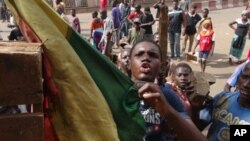People from northern Mali are mobilizing to help families affected by the fighting between government forces and Tuareg separatists. Northerners gathering in the capital Bamako on Sunday denounced any calls for autonomy by what some called "terrorists," and discussed ways northerners can help bring back stability.
The line that was on everyone’s lips was: "The territorial integrity of Mali is non-negotiable. Mali is one nation, indivisible."
Malick Alhousseini Maïga, president of an association of people from the north, said as Mali faces grave problems posed by the rebellion, northerners are in an unenviable position.
"We are the perpetrator and the victim at once," he said. "Perpetrator because it is indeed our brothers who have sparked hostilities. And victim because it is our home, the north, that is occupied. Victim because it is our families who are exposed to violence and being forced to flee."
Northerners are also victims because they are associated with those who attack and kill Malians, said Maïga. Tuareg, also known as Tamasheq, recently faced discrimination and attacks in Bamako and other parts of the south after rebels killed Malian soldiers. Malians say there is a risk such hostilities could emerge again if the government does not put down the rebellion soon.
One youth in Bamako, Albert Coulibaly, said that Mali must equip the army to end the conflict within weeks. If not, there will be combat among civilians, he said. Fighting, Coulibaly said, would break out between Tamasheq and black Malians, even though not all Tamasheq support the rebellion, .
A former Malian prime minister, Ousmane Issoufi Maïga, said the northerners’ activist group, known by its French acronym COREN, is committed to helping the government in any way it can to stabilize all of Mali.
He said the principal goal is a return to normal and a proper functioning of government throughout the country. COREN is there to support the government and armed forces as they pursue that goal, said Maïga.
Participants called on the government to reinforce the military in the north, many pointing to the formation of local vigilante groups in communities who feel their security is threatened. A lack of state authority in the north is one of many factors feeding the crisis, according to COREN.
Other factors keeping the north vulnerable are the displacement of communities and widespread food insecurity, said COREN member Mohamed Fall, adding that any effort to resolve the conflict in the north must address these issues.
COREN members say they will conduct missions to visit displaced Malians in and outside the country, assess their needs and work to facilitate their return home. The United Nations says at least 130,000 people have been displaced since fighting started in January.
Participants at Sunday’s meeting denounced any notion of dividing Malians between northerners and southerners.
Moussa Abdoul Karim, from the northern Gao region, sparked applause when he said, "I am not from the north, I am not from the south, I am a Malian." He said Malians must not forget the part of the national anthem that says, if the enemy should emerge, within or outside the nation, we are ready to stand and die.
COREN is collecting funds that leaders said would be used to help the army as well as people in the north affected by the fighting. Passing around cardboard boxes during the meeting, the group raised more than 1.3 million CFA francs or about $2,600.
Northerners in Mali Denounce Separatist Bid, Mobilize for Peace
- By Nancy Palus




